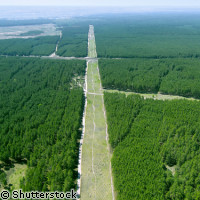Study investigates impact of climate change on tropical forests
Tropical forests have not modified their functioning in response to climate change, and continue to be major carbon sinks. However, evidence suggests that episodes of drought and other climatic disturbances will eventually limit these forests' capacity to absorb atmospheric carbon dioxide. These are the main findings of a major international study published in PLoS Biology. Tropical forests account for nearly two-thirds of terrestrial biodiversity and store more than half of the carbon in the biosphere. Recent studies have suggested that these forests are under direct threat from land-use changes, logging and other human activities. Other research has suggested that even apparently undisturbed rainforests may also be undergoing widespread shifts in carbon stocks as a result of environmental changes, such as increased atmospheric CO2 concentration, nitrogen deposition, temperature, drought frequency, and irradiance. Field studies have reported several patterns consistent with responses to global climate change, which include increases in aboveground biomass stocks, in tree turnover, and in the dominance of fast-growing species. Given the profound implications of these studies' findings on the future of one of Earth's most critical ecosystems, a team of international scientists decided to analyse the carbon capture capacity of tropical forests and measure the effects of climate change on how they function. Bringing together 38 scientists from 15 countries, for the first time, the study made use of forestry records initiated in the early 1980s, which inventoried more than two million trees belonging to nearly 5,000 species. The scientists developed novel statistical methods which, for a given species, made it possible to estimate the biomass of the trees. They were also able to define two groups of species: rapid-growing and slow-growing. For each studied plot, carbon assessments were performed at the scale of the ecosystem and for both of these groups of species. Based on these calculations, the scientists found that carbon storage capacity had significantly increased during the last two decades, confirming the role of tropical forests as major carbon sinks. No clear evidence was available to confirm the role of climate change on the forests. Instead, the scientists believe that many of the plots of forests are rebuilding themselves in response to unqualified human and natural disturbances that happened in the past. Research is therefore needed to understand what these past disturbances might be. The study finishes with a word of caution. Although there was no clear evidence of the impact of climate change on the forests was found, the scientists suggest that it is probable that climatic changes such as drought will come to play an increasingly important role in the future.

